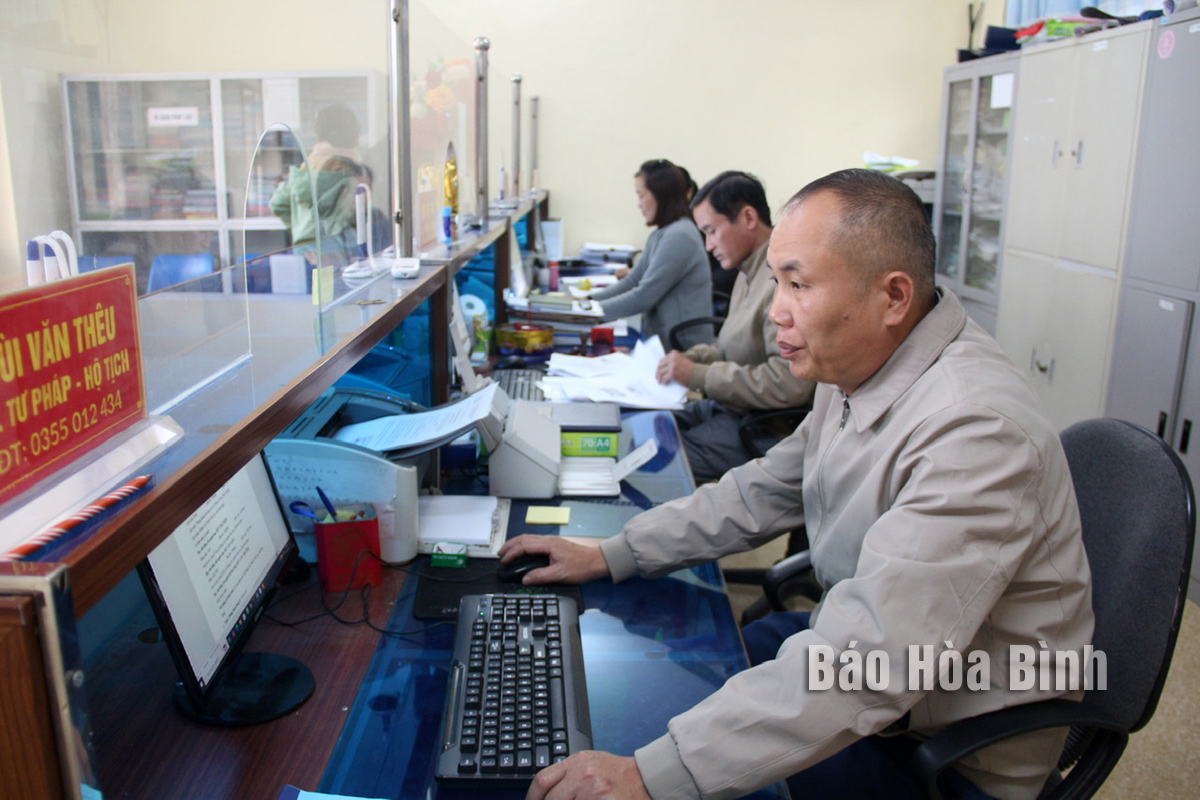



Public servants in Dong Lai commune of Tan Lac district apply information technology in processing administrative procedures online.
Digital government leading the way
With a strong commitment to achieving a comprehensive digital transformation, local authorities have concentrated on completing key goals such as building an e-government and promoting digitalisation in essential sectors.
For instance, in Dong Lai commune of Tan Lac district, the push for digital transformation and e-government development has led to several important advances. Bui Van Su, Chairman of the People’s Committee of Dong Lai, explained that in line with the province’s digital transformation plans, the local administration has focused on upgrading the skills of civil servants to meet the demands of the new digital age. As a result, 100% of officials have met the professional and academic standards required for their roles, and all administrative procedures are now processed online. This digital shift has also enabled the promotion and widespread trade of agricultural products and OCOP (One Commune-One Product) items, such as red grapefruit and purple sugarcane, through e-commerce platforms.
Similarly, in Lien Son commune of Luong Son district, 22 community digital transformation teams have become key facilitators, connecting local residents to the digital transformation goals. The commune has received over 300 administrative cases so far this year, with 100% of them submitted via the provincial online service portal at levels 3 and 4.
Bui Duc Nam, Director of the Hoa Binh Department of Science and Technology, emphasised that the province has pursued a comprehensive digital transformation strategy, prioritising the development of digital government to lead the charge in wider societal changes. The province has established 1,482 community digital teams at the village level and 151 at the commune level, involving nearly 13,000 members. These teams play a crucial role in bringing digital skills and technology to local communities. As a result, 100% of administrative procedures are now available online at level 4, with over 90% of provincial-level administrative cases and over 80% of district-level cases handled through digital platforms. The province has also successfully rolled out smart urban services in Hoa Binh city and Luong Son district.
Comprehensive advances across key areas
One of the standout achievements in the province's digital transformation is the leap forward in cashless payments. So far, the province has had 73 ATMs, 492 POS terminals, and nearly all local businesses and delivery services accepting QR code payments or internet/mobile banking transfers. The growth rate for cashless payment services is averaging 50% per year, with QR code payments seeing the most significant increase. Nearly 700,000 people aged 15 and above in the province now have bank accounts, accounting for approximately 80% of the population, surpassing targets set in the province's national financial strategy action plan for 2025.
This breakthrough in cashless payments has sparked growth in e-commerce and digital economy activities. As of now, the digital economy contributes 10.02% to the province’s gross regional domestic product (GRDP), and this figure continues to rise. Broadband fibre-optic networks cover over 80% of households, and 100% of communes and towns now have access to 4G/5G mobile services and smartphones. In total, 80% of businesses in the province engage in e-commerce, with 70% using email for business activities, over 30% maintaining up-to-date websites to promote products, and more than 30% involved in e-commerce platforms. Furthermore, around 30% of small and medium enterprises have their own websites to manage business operations and promote their brands.
These breakthroughs are attributed to the province's decisive implementation of the Party Central Committee's Resolution No. 36-NQ/TW on the development of information technology and Resolution No. 08-NQ/TU, issued by the Standing Board of the provincial Party Committee on digital transformation for the 2021-2025 period, with a vision towards 2030. This approach has led to a shift in both understanding and action, contributing to the province’s comprehensive socio-economic development and ensuring national defence-security, with citizens and businesses at the heart of the digital transformation process.